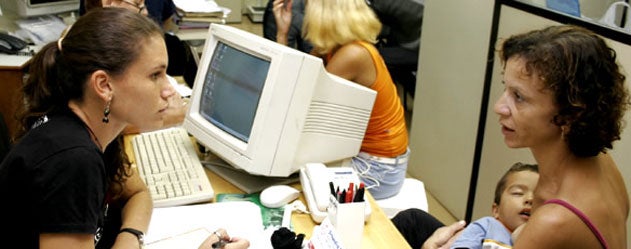Title: McCourt School Researches Impact of Brazilian NGO on Health, Poverty
Researchers at Georgetown’s McCourt School of Public Policy help determine the impact a nongovernmental organization has had on breaking the cycle of poverty and illness among economically challenged Brazilians.

Three researchers at Georgetown’s McCourt School of Public Policy (MSPP) have concluded that a nonprofit organization supporting families of children with severe health illnesses in Brazil is breaking the cycle of poverty and illness of slum dwellers in that country.
After a three-year study using rigorous field-based quantitative and qualitative methods, McCourt professors James Habyarimana and Jennifer Tobin and Ph.D. candidate Daniel Ortega Nieto (G’14) discovered that enrolling in the Saúde Criança program not only significantly improved children’s health, but also greatly helped close socioeconomic gaps.
“Attempts to eradicate poverty and promote social inclusion in the world depend crucially on targeting, design and the rigorous evaluation of programs,” said Habyarimana, MSPP professor and co-director of Georgetown University Initiative on Innovation, Development and Evaluation (gui2de). “The work of Saúde Criança travels beyond Rio de Janeiro’s borders. The sustained empowerment that shines through this evaluation demonstrates that Saúde Criança enables poor families to improve their livelihoods and take control of their own destinies.”
MSPP, launched this past October, focuses on the use of evolving technology and “big data” to help solve today’s most pressing issues.
Uplifting Families
Saúde Criança, a nonprofit organization focused on supporting families with children who have severe health illnesses, works deep within Brazil’s most poverty-stricken shantytowns or favelas.
After seeing child after child enter the vicious cycle of re-hospitalization, Dr. Vera Cordeiro, founder and CEO of Saúde Criança, realized that more needed to be done to address the long-term health of chronically ill children.
“One cannot expect a child with a severe respiratory disease to get better if the home that he or she returns to after medical treatment is entrenched in poverty,” Cordeiro said. “Saúde Criança is dedicated not only to saving children’s lives, but also to uplifting their families from poverty and toward the path of self-sustainability.”
Saúde Criança works one-on-one with families to develop Family Action Plans that provide resources and support in five key areas – health, citizenship, education, housing, and income generation, Cordeiro said.
Measuring Impact
Recognized in 2012 as the Best NGO in Latin America by the Global Journal, Cordeiro says the organization has helped more than 50,000 people and inspired health institutes and hospitals throughout Brazil to adopt its model of uniting health and human rights.
The McCourt impact study on the long-term benefits of Saúde Criança’s program is part of gui2de, a newly created initiative at Georgetown University to incubate and evaluate effective development solutions.
The initiative, spearheaded by the department of economics in Georgetown College and the McCourt School, brings together academics, innovators, policymakers, and development practitioners to conduct rigorous empirical field-based research to measure the effectiveness of policies designed to help people in developing countries.
Social Entrepreneurship
In 2006, Saúde Criança received the Skoll Award for Social Entrepreneurship in recognition of itsinnovativework inscaling andexpanding healthcare access and treatment in Brazil.
By celebrating the stories of social entrepreneurs like Cordeiro, the Skoll Foundation hopes to invest and advanceSaúde Criança’s goal to sharewith the worldits innovative methodology to uniting health and human rights according to Suzana Grego, with the Skoll Foundation.
“Evaluating the success of a program or policy is just as critical as its design and implementation,” says Edward Montgomery, dean of MSPP. “We are proud to be a part of Saude Crianca’s work.”